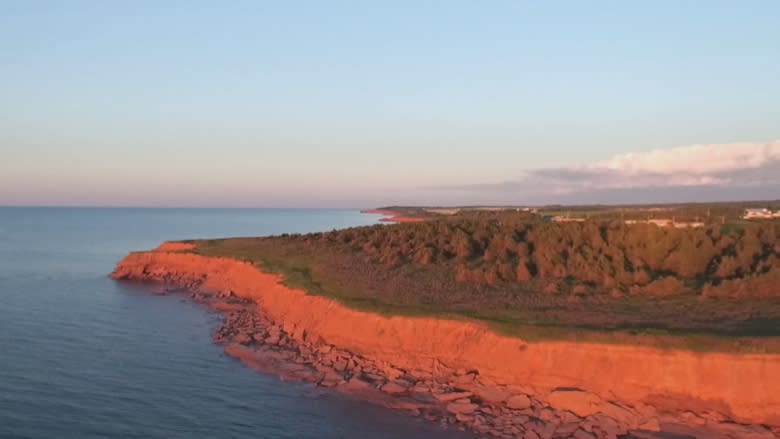P.E.I. government orders review of land ownership to determine if any rules being broken

Land ownership on P.E.I. will undergo a major review to determine how much land is owned by non-residents and corporations.
Minister of Communities, Land and Environment Richard Brown has asked the Island Regulatory and Appeals Commission (IRAC) to conduct the review to determine whether anyone is breaking the rules.
Brown told CBC News he's hearing more and more concerns from farming organizations — and from Islanders in general — over whether too much land is being controlled by large groups and by those who don't live on the Island year-round.
Brown says he's also heard from Islanders who worry about land speculation driving up prices and taking farmland out of production.
"There is a concern out there from Islanders of who owns our land, where are they from … and what is it doing for Islanders' opportunity to purchase property," he said.
"I think the best way to address these concerns is to have a formal review of land ownership on P.E.I. and to have the facts on the table," said Brown.
Farming concerns
Some of those concerns were voiced by the P.E.I. Federation of Agriculture at a legislative standing committee meeting last month, and similar concerns by the National Farmers Union surfaced at a previous meeting in November 2017.
Robert Godfrey, executive director of the P.EI. Federation of Agriculture, told CBC News values for farmland have been rising steadily since 2010 and that last year, this province had the highest percentage increase in Canada — as high as 15.4 per cent in Kings County.
Godfrey said his members worry rising prices will make it next to impossible for young farmers to buy land.
His group would like to see farmland given more protection from being converted to other types of development, and from being left idle.
"It is by far our biggest resource here on Prince Edward Island, is our land, whether it's for farmland or whether it's for a family of five to build a home and raise a family here on Prince Edward Island," said Godfrey. "We've got to make sure there are opportunities to purchase, and that it's affordable."
Review will look at speculation
"We don't mind them purchasing property and moving here. We don't like them purchasing property and holding and speculating it," said Brown.
"Islanders are saying to us, 'We should have the right to purchase Island land first,'" he added.
P.E.I. was once known as the million acre farm, but today farmland is estimated at half that level — about 233,000 hectares, or 575,000 acres, according to the P.E.I. Federation of Agriculture.
"It's crucial we keep as much land as possible into farmland," said Brown. "Because if we lose our farmland we lose a big economic driver in Prince Edward Island but also we lose our communities on Prince Edward Island if we give up farmland too easily."
Restrictions in place
There are restrictions on how much land one person or group can own on P.E.I.: individuals are limited to 404 hectares, or 1,000 acres, and corporations to 1,214 hectares, or 3,000 acres.
In addition, cabinet must approve non-resident purchases of two hectares (five acres) or more, and land with more than 165 feet of shore frontage.
Changes in 2016 required people to live in the province for 365 days over two years to be considered a resident, instead of the prior rule of six months in a year. In addition, a resident must be a Canadian citizen or a landed immigrant.
But Godfrey and others would like to see more restrictions.
While communities need to grow and development needs to happen, Godfrey said he would like to see prime farmland continue to be farmed.
"You drive out to certain parts of P.E.I. and you see subdivisions where there's three homes sitting on what was prime agricultural land only a few years ago."
Land control
The NFU has also singled out the Great Enlightenment Buddhist Institute Society (GEBIS), Cavendish Farms and Vanco Farms in its concerns over groups controlling too much land.
At the March legislative committee meeting Godfrey said government officials had told his organization that various groups of Buddhist monks and nuns in eastern P.E.I. have about 1,000 members, and collectively own about 2,000 hectares, or 5,000 acres, of farmland.
However, MLA Allen Roach told the committee the numbers government provided him were 320 monks owning about 445 hectares, or 1,100 acres, and 132 nuns owning 236 hectares, or 585 acres.
Brown says he's not sure of the exact number, but he's been told these groups are well within the land ownership limits, and he expects the IRAC review will confirm that.
"They come here. They live here. They get their residency and they're entitled to purchase land," said the minister.
However, he said, any large parcels of farmland that are taken out of production are a concern.
Brown says he's been eyeing new rules in Vancouver aimed at tempering speculation, which would require anyone buying a farm to continue to farm it.
"The Island's under a lot of pressure," he said, because its population is increasing. "People want to live here. People want to move here. And we just want to make sure the path forward is the best thing for Prince Edward Island."
Brown hopes the IRAC review will be finished in time to present to a legislative committee by this fall.
Lands protection
Last month, Brown also said government plans to double its protected land base, to seven per cent by 2020.
The minister said he planned to work closely with the Island Nature Trust and the Nature Conservancy of Canada to reach this goal.
More P.E.I. News
Correction : A previous version of this story incorrectly stated that the P.E.I. Federation of Agriculture had singled out the Great Enlightenment Buddhist Institute Society (GEBIS), Cavendish Farms and Vanco Farms. In fact, it was the NFU.(Apr 23, 2018 1:51 PM)


